|
|
|
Sort Order |
|
|
|
Items / Page
|
|
|
|
|
|
|
| Srl | Item |
| 1 |
ID:
131029
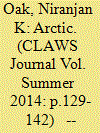

|
|
|
|
|
| Publication |
2014.
|
| Summary/Abstract |
Regionalism as a political project has been a signi?cant phenomenon in post-1945 international relations. The third phase of regional integration began towards the end of the 19805 within the international context created by the end of the Cold War. Academics dubbed it as "new regionalism".' Most of the regional organisations that came up in those days were based on economic cooperation among the states. It was an era of globalisation. The Arctic Council (AC) which emerged in 1996 was a unique case. The 'Arctic' has emerged as a region in international cooperation during the past 20-30 years, as manifest in the creation of the AC. The objective of the AC was sustainable development and environmental protection only, and that is why it may be termed as a unique case in that period.
|
|
|
|
|
|
|
|
|
|
|
|
|
|
|
|
| 2 |
ID:
167466
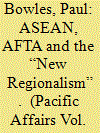

|
|
|
| 3 |
ID:
128269


|
|
|
|
|
| Publication |
2014.
|
| Summary/Abstract |
The study of Chinese political economy has experienced a sea change since the late 1990s; instead of debating the origins and direction of national reform, scholars have turned to examining the origins of local economic variation. This article reviews recent work in the regional political economy of contemporary China. In keeping with a movement in comparative politics toward analyzing subnational politics, the "new regionalists" seek to identify and explain meaningful heterogeneity in the Chinese polity and economy. Yet they go further than simply using subnational cases to generate or test theories about Chinese politics. Instead, they propose that subnational political economies in China are a function of endogenous change rather than a reaction to national priorities. After identifying differences between the "new regionalism" and previous studies of decentralization in China, the author discusses this work according to the theoretical approaches (institutional, ideational, and sociohistorical) used to explain the origins of regional differences. She concludes by examining the limitations of the new regionalist agenda in comparative and historical context and suggesting that scholars move past unconditional acceptance of the causal power of "socialist legacies" and instead attend to the importance of changes in the post-Mao administrative hierarchy.
|
|
|
|
|
|
|
|
|
|
|
|
|
|
|
|
| 4 |
ID:
111543
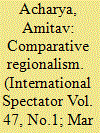

|
|
|
|
|
| Publication |
2012.
|
| Summary/Abstract |
Is comparative regionalism a field whose time has come? While the contemporary interest in comparing regions and regionalisms may be not completely new, it is different from older approaches. Our understanding of what makes regions has changed with social constructivist and critical theoretical approaches that have led to a less behavioural and more nuanced, complex, contested and fluid understanding of regions. Moreover, the globalisation phenomenon has deeply affected all social sciences and radically redefined the relative autonomy of regions. In keeping with the rapid growth and development of regionalism and institutions in the non-Western world, including in regions which were relatively late starters, such as Asia, there have emerged new ways of looking at regional cooperation, including claims about distinctive approaches and even 'models' that are not only different from those identified with the EU, but also supposedly more appropriate and thus 'workable' for non-Western regions than the EU straightjacket.
|
|
|
|
|
|
|
|
|
|
|
|
|
|
|
|
| 5 |
ID:
112408


|
|
|
|
|
| Publication |
2012.
|
| Summary/Abstract |
This article engages in the debate on (the study of) regionalism in providing an overview of the nexus between European Studies (ES) and (New) Regionalism (NR). While the immediate purpose for doing so is to set the stage for the future debate on regional dynamics, this exploration can also be perceived as a case study into (the plurality of forms of) inter/intra-disciplinary dialogue demonstrating the necessity of engaging in 'dialogues about dialogues'. The article starts by developing a new typology of four different ideal-typical notions of dialogue: hierarchical, reflexive, transformative and eristic models of dialogue. Each of these models is then used to examine different ways of answering questions about why a dialogue between ES/NR should be of interest or not; what ES has to offer; what the coveted impact of such a dialogue is supposed to be; and, finally, which promises and pitfalls such a conversation holds. In this fashion, the stage for future debate addressing regional integration is outlined. It is concluded that these futures look bleak, however, especially because ES and NR no longer appear as each other's ideal partner-in-dialogue and the relationship is likely to come to an end and hence await its own funeral.
|
|
|
|
|
|
|
|
|
|
|
|
|
|
|
|
| 6 |
ID:
167469
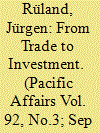

|
|
|
| 7 |
ID:
149506
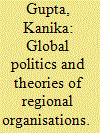

|
|
|
| 8 |
ID:
089273
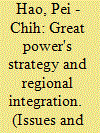

|
|
|
| 9 |
ID:
126798


|
|
|
|
|
| Publication |
2013.
|
| Summary/Abstract |
In a recent piece in this journal Jørgensen and Valbjørn develop a typology of intellectual dialogue across fields that yields rather negative conclusions about the prospects for sustainable dialogue between 'European studies' and the 'new regionalism'. This response disputes this pessimistic conclusion. First, it is argued that while their derivation of models of dialogue is impressive, it is nonetheless incomplete. Using Jørgensen and Valbjørn's premises, the article derives a 'market' mode of dialogue that represents a challenge to their assumption that dialogue will tend towards hierarchy. Second, the article accepts that there are important 'sociology of knowledge' impediments to effective dialogue within political science and International Relations, but maintains that Jørgensen and Valbjørn fail to work through the question of 'dialogue between whom?' The article argues that methodological division is the most significant impediment to dialogue, but maintains that within-methodology dialogue is more than viable in the case under scrutiny in this debate. Third, having established these general parameters of disagreement, the article moves to a number of more particular criticisms of the assumptions made by Jørgensen and Valbjørn about extant calls for dialogue between scholars in these two fields.
|
|
|
|
|
|
|
|
|
|
|
|
|
|
|
|
| 10 |
ID:
123764
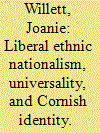

|
|
|
|
|
| Publication |
2013.
|
| Summary/Abstract |
Within the liberal paradigm, ethnic nationalism and identity are often conceptualized as 'exclusive', lacking the capacity for universal membership (Ipperciel 2007; Kohn 1946; Kymlicka 1995), and is juxtaposed against 'inclusive', civic forms of identity. This article problematizes this claim, asking whether civic territorial identities also contain their own forms of exclusion. Using the New Regionalism and the identity politics of contemporary economic development, this article explores civic/ethnic identities in Cornwall in the context of Agnew's (2005) observations about contemporary liberal values. The article finds that, in Cornwall, civic forms of territorial identity that distance themselves from ethnic Cornishness are more exclusive than contemporary ethnic nationalism in the region, introducing economic rather than ethnic exclusions. This raises questions about why ethnic identity can be negatively characterized in regional development discourses and what the effects of this might be.
|
|
|
|
|
|
|
|
|
|
|
|
|
|
|
|
| 11 |
ID:
144564
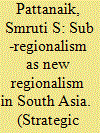

|
|
|
|
|
| Summary/Abstract |
India’s engagement with its neighbours received a policy reinvigoration after the National Democratic Alliance (NDA) government assumed power and announced its ‘neighbourhood first’ policy. The first sign of this policy was visible when Prime Minister Narendra Modi invited all the heads of state of the neighbouring countries for his oath-taking ceremony, on May 26, 2014. India’s interest and engagement with the South Asian Association for Regional Cooperation (SAARC) has also intensified in the past few years – from being a reluctant player to driving the regional economic agenda. Unlike in the past, Prime Minister Modi undertook his first foreign visit to Bhutan, followed by visits to Nepal, Sri Lanka, Mauritius, Seychelles and Bangladesh, to synergise bilateral relations. India had already intensified its cooperation at the regional and sub-regional levels and the NDA government was proactive in taking these engagements forward. Regional as well as sub-regional cooperation became major vehicles of India’s neighbourhood policy, at the core of which was the development agenda of the present government.
|
|
|
|
|
|
|
|
|
|
|
|
|
|
|
|
| 12 |
ID:
115239
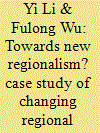

|
|
|
|
|
| Publication |
2012.
|
| Summary/Abstract |
This paper draws on a series of interviews with urban planners and government officials to examine the changing regional governance in the Yangtze River Delta. It finds that integration and collaboration are emerging and the growing economic benefits of intercity cooperation serves as a driver for local government to change from hostile competition to collaboration. Nevertheless, regional governance is far from established. Instead, regional transformations reflect the local politics of economic devolution and urban entrepreneurialism. Currently, there is no formal regional institution or coalition and the regional agenda is economic oriented and project based. Policies are formulated by individual cities rather than through multilateral negotiation between cities. The primary motive underlying the initiatives for cooperation is regional economic competitiveness rather than regional integration. Hence, the paper argues that emerging collaboration is far from being a substantial departure from inter-jurisdiction competition in the earlier phase of regional governance.
|
|
|
|
|
|
|
|
|
|
|
|
|
|
|
|
|
|
|
|
|